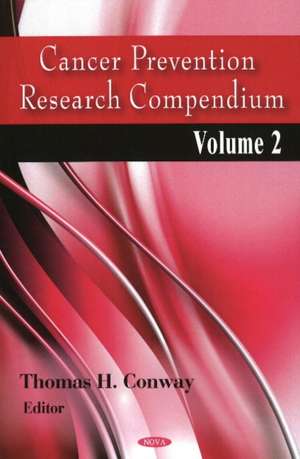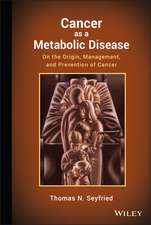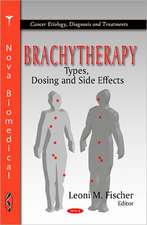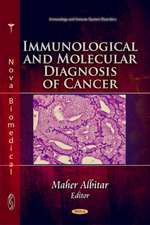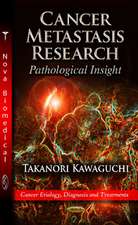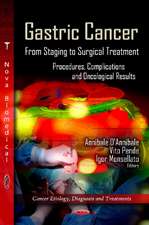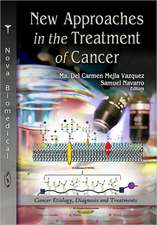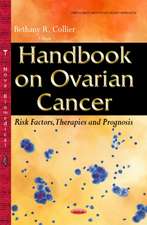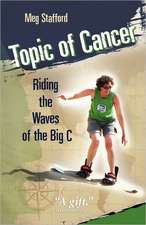Cancer Prevention Research Compendium
Editat de Thomas B. Garciaen Limba Engleză Hardback – 19 iul 2009
Preț: 1314.57 lei
Preț vechi: 1791.78 lei
-27% Nou
Puncte Express: 1972
Preț estimativ în valută:
251.62€ • 273.41$ • 211.50£
251.62€ • 273.41$ • 211.50£
Carte disponibilă
Livrare economică 31 martie-14 aprilie
Preluare comenzi: 021 569.72.76
Specificații
ISBN-13: 9781604566642
ISBN-10: 1604566647
Pagini: 522
Ilustrații: colour illus
Dimensiuni: 188 x 261 x 40 mm
Greutate: 1.29 kg
Ediția:New.
Editura: Nova Science Publishers Inc
ISBN-10: 1604566647
Pagini: 522
Ilustrații: colour illus
Dimensiuni: 188 x 261 x 40 mm
Greutate: 1.29 kg
Ediția:New.
Editura: Nova Science Publishers Inc
Cuprins
Preface; Direct-to-Consumer-Advertising Exposure Impedes Lifestyle-Focused Cancer Prevention Efforts; Antioxidant Properties of Vitamins and Their Role in Skin Cancer Prevention; P-Glycoprotein Expression in Human Tumors and Tissues: The Multidrug Resistance Gene Family; CYP17 as a Candidate Gene for Hormone-Related Cancers Among Women: A Review of the Evidence; Bone Mass Density and Subsequent Risk of Prostate Cancer; Black Raspberry Extracts Induce Growth Inhibition in Human Oral Carcinoma Cells; Detection of Bladder Cancer in Patients with Asymptomatic Hematuria by Urinary Matrix Protein 22, Voided Cytology and Cystoscopy; Induction of Apoptosis and Inhibition of Cell Proliferation by Diphenylmethyl Selenocyanate During Azoxymethane Induced Rat Colon Carcinogenesis; Hemostatic State in Female Patients with Breast and Ovarian Cancer; Development of a Fully "Humanized" Xenograft Model of Breast Cancer - New Ideas for the Development of Pre-Clinical Prevention Models; Mouse Mammary Tumor Virus (MMTV) Like Sequence in Breast Cancer of Egyptian Women; Low Concentrations of Green Tea Catechins Transiently Induce and Inhibit MAPK Signal Transduction and Growth of Human Colon Tumor Cells; The Effects of Red Raspberry Extract on PAH Transport Across Calu-3 Cell Monolayer: An In Vitro Cell Model; Modulation of Arsenic Induced DNA Damage by Tea as Assessed by Single Cell Gel Electrophoresis; Gastric, Colorectal and Pancreatic Carcinoma: The Relationship between Hemostasis and Cancer Prognostic Markers; A Theory-Based Model for Predicting Adherence to Guidelines for Screening Mammography Among Women Age 40 and Older; Mechanisms Involved in the Antitumor Activity Exerted by Yoghurt in an Experimental Colon Cancer Model; Aspirin Use and Risk of Lung Cancer; Role of Mammography in the Diagnosis and Screening of Breast Cancer Among an Egyptian Cohort; The Pathology of Male Breast Cancer; Antisense and Triple Helix Anti IGF-I Tumour Vaccines: Gene Therapy of Gliomas; Indole-3-Carbinol (I3C) Modulates Expression of DNA Methyltransferases 1, 3a, and 3b in Pancreatic Cancer Cells: Effects of Gender and a Novel (C?T) Polymorphism in the Promoter Region of DNMT 3b; Hemostatic State in Lung Cancer Patients: Pilot Study; N-7-Alkyl-2'-Deoxyguanosine as Surrogate Biomarkers for N-Nitrosamine Exposure in Human Lung; Perceptions, Knowledge and Behavioral Practices for Breast Cancer Prevention in Muslim Women; Over Expression of P53 and P21 in Normal Oral Mucosa Adjacent to Resected Squamous Cell Carcinomas May Be An Evidence of Field Cancerization; Successful Biochemoprevention in a Patient with Multiple Aerodigestive Malignancies; Dietary Cinnamon (Cinnamomum zeylancium) Can Inhibit The Formation of Colonic Aberrant Crypt Foci During Experimentally Induced Colon Carcinogenesis in Swiss Albino Mice; Gastrointestinal Microflora, Bioactive Dietary Components and Cancer Prevention; Cancer Prevention by Functional Foods; Recent Progress of ncRNA in Cancer Research; Dependence of Radiofrequency Carcinogenic Effects on the Pre-Existent Oncogenes; Chemotherapeutic Role of Retinoids in Chemically Induced Breast and Skin Carcinogenesis on Albino Mice; Mammographic Breast Density and Breast Cancer Risk: Where Do We Go From Here?; Can Pap Smear Exclude the Need for Colposcopy in Referred VIA-Positive Cases?; Precancerous Conditions of the Colon; Multistage Carcinogenesis in Animal Models; Testicular Cancer Epidemiology in the Slovak Republic; Index.
